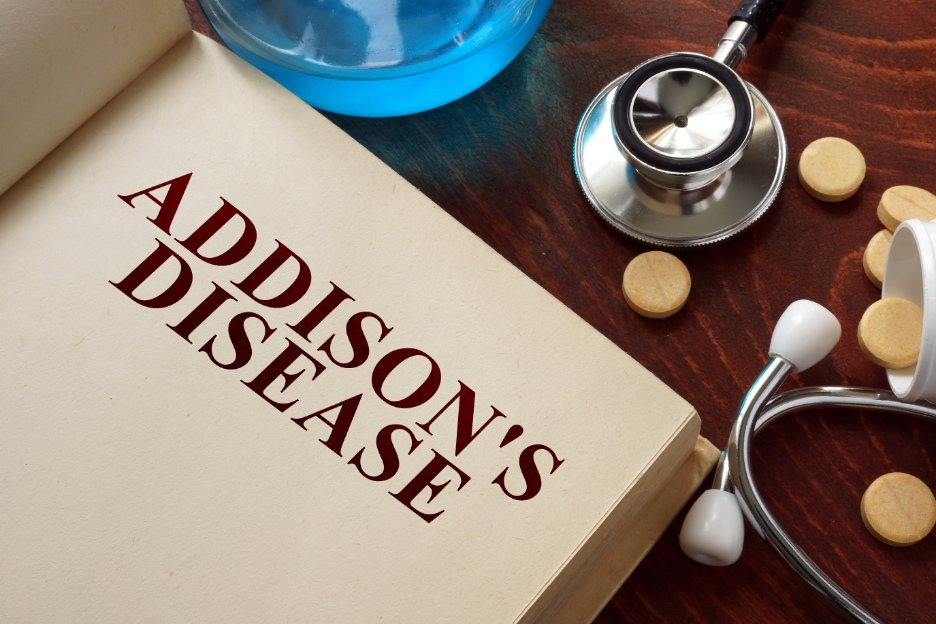Addison’s disease usually builds up slowly over months, which is why many people don’t notice it at first. They might just think they are tired from work or not sleeping properly. Some even blame it on stress or a cold or flu. This is one of the key reasons why Addison’s disease often goes undiagnosed for a while.
Below, our endocrinologists in East Chicago, Indiana are going to explain both the early and late warning signs of Addison’s disease.
Fatigue in Addison’s disease is not regular tiredness.
Unlike ordinary tiredness that goes away after a nap or a cup of coffee, fatigue in Addison’s disease stays. People usually describe it as a deep, draining fatigue. You might feel like you are carrying something heavy around, and even walking across a room or picking something up can take effort.
This happens because your body is not making enough cortisol or aldosterone. These hormones keep your energy up, and your body can’t keep up when they are too low.
If you have been feeling exhausted day after day and rest does not help, it might be time to talk to an endocrinologist in East Chicago, Indiana.
What are the first symptoms?
One of the first symptoms of primary Addison’s disease is skin darkening. This can show up on your lips, tongue, gums, palm lines, scars, and around your nails. It happens because of elevated ACTH that affects melanocytes (skin pigment cells).
You might also start craving salt more than usual. That is because your body is losing sodium and trying to tell you that it needs more.
Other common early symptoms include constant tiredness, loss of appetite, nausea, occasional vomiting, and unintended weight loss. These symptoms develop slowly and can be easily overlooked or misattributed to other conditions. But if you are experiencing many of these symptoms together, you should consult an endocrinologist for evaluation.
Dizziness and low blood pressure are common in Addison’s.
Many people with Addison’s disease feel dizzy when they stand up. That dizzy spell is called orthostatic hypotension, and it means that your blood pressure drops when you get up.
When this happens, not enough blood gets to your brain, which is why you might feel lightheaded or weak. Some people’s vision goes blurry, and a few might even faint.
If it keeps happening to you or comes with other symptoms like fatigue or salt cravings, see an endocrinologist immediately.
Mental and emotional symptoms in Addison’s.
Addison’s can also impact your mood and brain. You might feel more anxious, more irritable, or even depressed. You might also find it harder to handle stress. Some people even feel foggy, forgetful, or struggle to focus, even if they are on treatment.
These symptoms are tied to the body’s inability to maintain normal cortisol levels. Cortisol is the hormone responsible for brain function because it regulates mood, attention, and memory. When your body can’t keep cortisol at the right level, your sleep could suffer, and that can make it even harder to think clearly or feel like yourself.
If you are dealing with these symptoms, it’s best to consult with an experienced endocrinologist in East Chicago, Indiana as soon as possible.
What does an adrenal crisis look like?
Most of the time, Addison’s develops slowly. But sometimes, it can take a serious turn. This is called an adrenal crisis and it is a medical emergency.
In a crisis, the body suddenly runs too low on cortisol. Without that hormone, it can’t control blood pressure or deal with stress.
It can start with tiredness, nausea, stomach or back pain, dizziness, or vomiting. Your blood pressure can drop, your skin can turn pale or bluish, and you might even pass out. If it is not treated immediately with IV medicine, it can even be fatal.
Adrenal crises are usually triggered by illness, injury, surgery, or stress, especially if you do not adjust your medicine. Many people who have a crisis do not even know they have Addison’s, which is why early diagnosis is crucial.
Looking for an Affordable Endocrinologist in East Chicago, Indiana?
Are you looking for an experienced endocrinologist in East Chicago, Indiana who can help you figure out what’s behind your symptoms? If so, our team at 219 Health Network is here to support you. Contact us today at 833-219-0001 to schedule a visit with one of our specialists.


